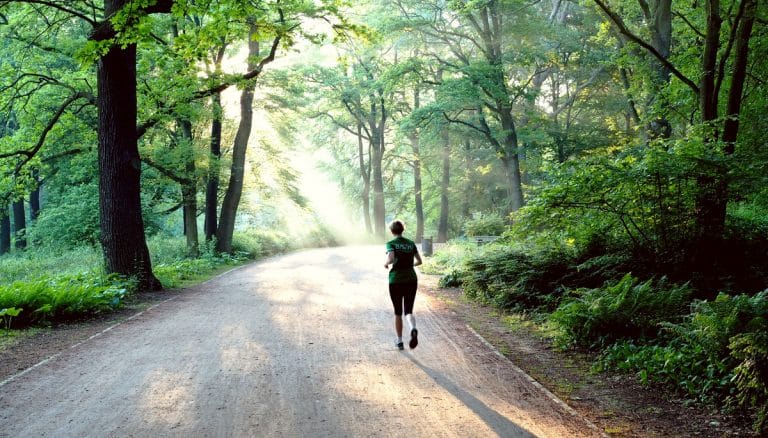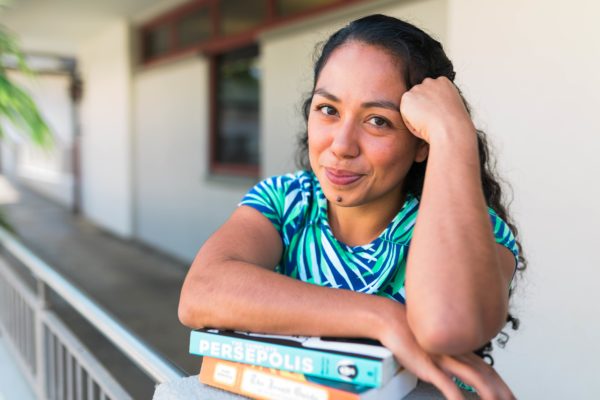
Image by Andreas Zieroth/Flickr, Attribution-NonCommercial-NoDerivs.
Running Is Moving Meditation
The first few steps of a run never feel good.
Sure, there’s the occasional day where I’m dying to run, where I’ve been waiting all day for the moment when I can prepare with my own ritual: adorn myself in essential garments (shorts, sports bra, socks), check necessary accoutrement (watch, phone), perform a sacred set of stretches as I put my shoes on. I shake my limbs out for a moment, take a breath, then launch myself off the concrete and onto the road. My muscles spring back and the shock absorbers of my quads reverberate as I begin to pound pavement.
Some days, when I do this, my mind immediately sends a thousand lights across my cortex. Ah, yes, I think, I love this! I smile as I bounce down the sidewalk.
Many days, though, I settle myself in for the feeling that inevitably hits sometime in the first mile. My muscles begin to ache and loosen up. My feet start feeling sore, saying, “Hey! You keep hitting us! Stop that!” After nearly six years of running, I now know that this feeling will usually go away after three miles, and the run will begin to feel OK.
Three miles can feel like a long time, though, and like lots of runners, I used to distract myself by listening to music. I had a playlist of anything that I could focus on until I got near the end of the run and could think, Hey, I ran and I barely even remember it!
Then I came across this passage in Christopher McDougall’s Born to Run:
“Relax enough [into the run], and your body becomes so familiar with the cradle-rocking rhythm that you almost forget you’re moving… You have to listen closely to the sound of your own breathing… and ask yourself, honestly and often, exactly how you feel. What could be more sensual than paying exquisite attention to your own body?”
Oh, that sounds nice, I thought to myself. And with little fanfare, I decided to see if I could begin to run silently.
At first, it was torture. All I could focus on was how much everything ached. My feet and legs hurt. My shoulders were so tense my biceps would cramp — something I had noticed before, but had never really paid attention to. Hunched over and wearing a sour expression, I hobbled my way through runs like an angry troll on the worst mission ever.
After a few more runs, though, I began to focus my thoughts on something other than my frustration. I considered the quotation that had inspired me to do this in the first place and sought the “cradle-rocking rhythm” McDougall described. I imagined myself soothed and relaxed. Then I began to think about every part of my body. How did my legs feel? How did my back feel?
Eventually, the “sensual” contemplation of the physical became a contemplation of the spiritual. After finding that rhythm, I often found myself thinking through my life problems. I would debate, I would consider, I would vent.
A few months later, an acquaintance learned I was a marathoner and asked, “What do you think about while you run?” Without hesitation, I responded, “I meditate.”
I surprised myself. While I’d always considered myself a mindful person, I often had trouble meditating. I would get distracted by my phone, or bugs, or the wind, or how thirsty I was or how hot I was or a million other things. Running was not the zen, silent space I imagined I could meditate in. With my feet pounding and arms pumping, how was I finding inner calm?
Then, I realized God had been meeting me with moving meditation for years.
It is April of 2013. I am running. It is not going well. I am thinking about Batman. The new guy I am seeing loves Batman, and so I recently re-watched Batman Begins.
After getting hit by a car while running two years ago, I’m still astounded that I can run even a mile. Still, now that I am able to run, I am aghast at my speed — or lack thereof. I would see my pace after a mile and a voice would scream in my head, Seriously? If you’re going to run that slow, why are you running at all?
I hate that voice, but have lived with it for years. Runners live by the watch. We agonize over split times. We scale back or up the pace at which we are trying to fly, based on the speed that a careful calculation has told us we should match.
During this springtime run, though, my left hip began to throb. I knew I needed to stop and stretch, but this angered me. How could I stop now? I’d have to slow down. Maybe I should just stop altogether. Maybe I’m not going to run right ever again. I stopped to stretch out my hip, grumbling at everything.
In this moment, when I was at my lowest, a strange thing happened: Michael Caine’s voice popped into my head. It wasn’t exactly the angel Gabriel speaking to Mary, but I suddenly heard the oft-quoted Alfred line:
“Why do we fall? So we can learn to pick ourselves back up.”
So, I asked myself, why am I running? Am I being chased by something?
No. I was running because my heart demanded it. I was running because it gave me freedom. I was running because the mere action brought me joy, no matter how fast I did it. I was running because pounding my feet into the pavement was the only way to hammer myself back together. I was running to pick myself back up.
If that was why I was running, any run was still a good run. It didn’t matter how fast I did it. I needed to “hold the mirror up,” as Father Greg Boyle says, and hear the truth:
“You say: you are exactly what God had in mind when God made you.”
I decide to delight in myself exactly as God made me. I finish my stretch and begin to run again.
St. Ignatius of Loyola call us to “find God in all things.” God the companion, God the seeker, meets us wherever He can.
I understand now that God does not have to live in the “sacred” spaces I had been confining Him to: churches and shrines, places appearing to be “where God could live.” As I seek Him myself, I understand that God exists in all things and all moments. He has never not been there. God moves outside the dim candlelight I have resigned our relationship to for years, and weaves His way into the moments of physical sensuality when we are most aware of ourselves, or the lowest moments when we desperately seek refuge.
God lives in the pumping of my arms and pounding of my feet. God is the thousand lights shooting in my cortex as I bounce down the sidewalk smiling. Sometimes, God is even the voice of Michael Caine in Batman, meeting me while I run. The question is if I will stop distracting myself from what is there — pains, aches, and all — and hear His voice in return.
